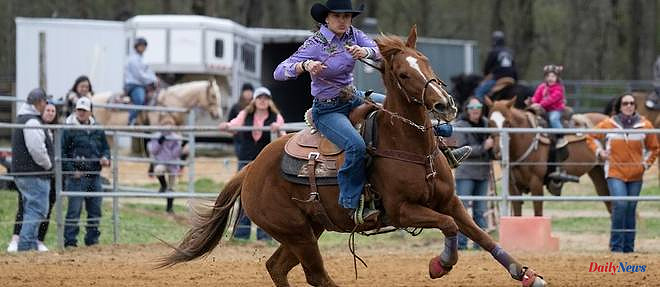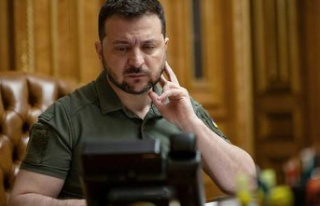Wearing a cowgirl hat, focused mine, Morissa Hall perched on her mare Lena gallops into the arena and slaloms with dexterity between three barrels during a rodeo competition organized in the American state of Maryland.
The 16-year-old African-American is one of the rising local stars of this sport, a symbol of America par excellence, but whose image and practice remain very white and masculine.
The spectators, who observe on a cold April day, wrapped in blankets, the sixty or so riders compete in this "barrel racing" event where speed prevails, are thus mainly white, as are most of the participants.
"When I started, people stared at me because I was one of the only colored cowgirls. It made me feel uncomfortable," the teenager told AFP, proudly sporting her Maryland High School Organization "Rodeo Queen" sash.
Tempestt Martin, who grew up in Washington, was also the target of these wary looks in her early days, when she and her aunt traveled to barrel racing competitions in the area.
"When we think of a cowboy, we have the stereotype of a white man on horseback", says the 23-year-old young woman who created, with three childhood friends, the collective of afro cowgirls -American "Catch this smoke".
Yet after the Civil War (1861-1865), a quarter of cowboys in the American West responsible for herding cattle were black, according to historian Kenneth Wiggins Porter.
"It's a cliché that black women don't ride horses," slams Brittaney Logan, with her brow bone piercing and bright pink T-shirt emblazoned with the Tempestt team she recently joined. "We are here. We have always been here".
"We go to McDonald's on our horses! I want black women to see it's there. It's accessible," adds the 36-year-old horsewoman.
The five women are training in intermittent rain to compete in September's horseback relay race event at the Bill Pickett Invitational Rodeo, a traveling rodeo for the African-American community that draws thousands of people each year.
An event also attended by Reagan and Ryan Jackson, 12-year-old twins, champions of several rodeo disciplines in high school organizations in Maryland and neighboring Virginia.
They exercise regularly with Morissa Hall on the family farm in Upper Marlboro, a small green town in Maryland, less than an hour southeast of the United States capital.
On their respective mounts, they strive to zigzag between six poles ("pole-bending"), to lasso calves ("breakaway roping") or even to throw themselves off their horses to bind three legs of a goat ("goat-tying"). All as quickly as possible and under the sharp eye of their coach, that is to say their father.
"I would love for her to turn pro and be the first woman of color at the national rodeo final. That would be huge," Morissa's father, Morse Hall, said quietly. "But I can't necessarily give her the kind of horse that will make her a champion. We'll do the best we can."
Corey Jackson, father of Reagan and Ryan, whose two sons also participate in rodeos, says he pays 50,000 dollars a year in this equestrian sport, from entry fees to competitions to horse maintenance.
"It's not given. It's probably one of the reasons why there are not many African-American families who participate in rodeos on the east coast," he explains.
"If you weren't born into it, rodeo is one of the hardest sports to get into," says Jackson.
A horse can cost from $5,000 to $50,000 to purchase depending on its age and level of training.
"It's no secret that a lot of our white brothers and sisters have had a head start, but that doesn't mean we can't get there," said Brittaney Logan, who doesn't. didn't grow up surrounded by horses and took part in her first rodeo at the age of 28.
“A lot of them grew up in the show business when it comes to the rodeo circuit. They have the sponsors, they pass them on to their kids,” she continues. "But we will get there. We too will have sponsors and we are finally recognized".
"I want to break records. And I think we can do it," says Tempestt Martin, whose smile reveals sparkling dental braces.
27/04/2023 14:12:12 - Upper Marlboro (Etats-Unis) (AFP) - © 2023 AFP












